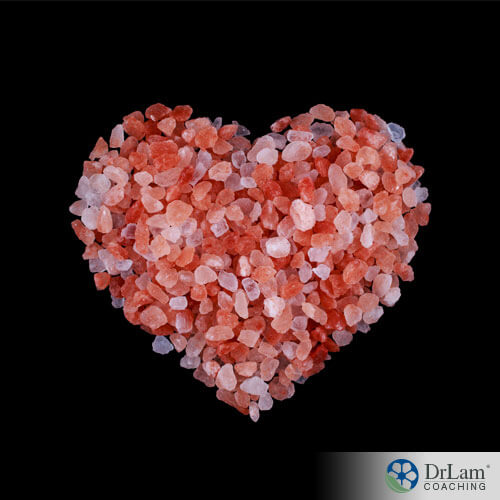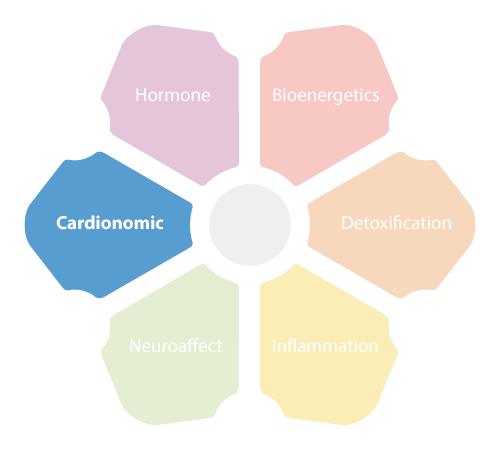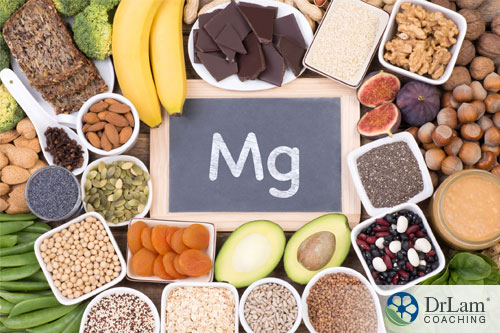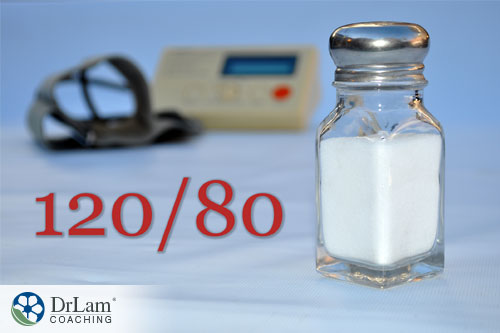
Salt and high blood pressure seem to go hand in hand, or so we’ve been told countless times by concerned friends, family members, and even healthcare professionals. Of course, this little tidbit of information is often followed by a lecture on why you’re on your way to a heart condition because, as everyone knows, high blood pressure causes heart attacks. Yet, even when you lower your salt intake, you find your blood pressure is still off the charts and you have no idea why. The answer is simple: salt may not be the cause of your hypertension.
The idea that salt is responsible for high blood pressure is based on the theory that excess salt intake leads to water retention within your intra-and extra-cellular fluids, thereby increasing the pressure acting on your blood vessel walls. This belief goes back to a study on salt and high blood pressure performed in rats. However, the rodents were fed the equivalent of more than 80 times the amount of salt an average human being would consume under normal conditions. No regular rat would, or could, consume that much salt at one time. Nor would an average person for that matter. Because the rats were exposed to excess amounts of salt, in truth, no parallels can accurately be drawn with human salt consumption.
 Higher than average intake of salt and high blood pressure don’t necessarily go hand in hand when it comes to human beings. This is based on the assumption that, unlike the rats in the study, you’re not planning on consuming 80 times more than an average person.
Higher than average intake of salt and high blood pressure don’t necessarily go hand in hand when it comes to human beings. This is based on the assumption that, unlike the rats in the study, you’re not planning on consuming 80 times more than an average person.
More recent studies on salt and high blood pressure have shown that in geographical regions where salt consumption is lower than average, people tend to have lower blood pressure. But losing weight is also proven to be a significant factor contributing to reduced blood pressure. And while some studies do indicate that consuming less salt can reduce your blood pressure, hypertension may boil down to more than just your salt intake. In other words, salt may not be the reason for your high blood pressure.
In some cases, blood pressure does go up after consuming salt. However, these people tend to have what is known as a ‘salt sensitivity.’ Although the physiological reasons for salt sensitivity are not yet fully understood, it is currently thought to be related to abnormalities in your body’s sodium balance. Salt sensitivity and high blood pressure can also be partly down to your genetic makeup. Certain population groups tend to be more sensitive than others and age may also play a role in the correlation between salt and high blood pressure. Older people tend to be more susceptible and in general, women are much more prone to high blood pressure associated with salt sensitivity than men.
But there’s more to it than just that. As previously mentioned, weight can be a contributing factor, moreover, stress, dehydration, and certain nutritional deficiencies may also significantly increase blood pressure.
Obesity is probably one of the main reasons for high blood pressure and losing weight is known to lower blood pressure. If you are overweight, losing just ten pounds can significantly reduce your blood pressure while at the same time reducing your risk of heart disease.
Most people are aware of the importance of staying hydrated, especially in the heat, but few realize that grabbing a caffeinated soda to quench your thirst can actually increase dehydration. In addition to being potentially fatal, dehydration has a number of dangerous side effects, which include
If your cells lack water, your brain will send out chemical messengers telling your blood vessels to constrict in order to conserve whatever fluid is available, resulting in high blood pressure. This is also your body’s way of increasing blood flow to the brain, the most important organ in your body. Your brain will do whatever it takes to protect itself and thus sustain life. Once you rehydrate, your brain will send out the necessary signals to stop the constriction of blood vessels and your blood flow will return to normal, depending on other relevant factors. Here, there is no connection between salt and high blood pressure.
 Studies have shown that stress may not be the direct cause of high blood pressure, but it certainly seems to be a contributing factor.
Studies have shown that stress may not be the direct cause of high blood pressure, but it certainly seems to be a contributing factor.
When you experience stress, your body goes into protective mode, triggering an increase in the production of vasoconstricting stress hormones, of which cortisol is the most prominent. In other words, your blood vessels constrict, thereby elevating your blood pressure. If stress continues over the long-term, your body will experience continuous blood pressure spikes that, in conjunction with other factors, may influence the development of hypertension and even Adrenal Fatigue Syndrome (AFS). The production of stress hormones is triggered by the NeuroEndoMetabolic (NEM) stress response system, your body’s main defense against stress.
Again, in this instance, salt and high blood pressure are not connected.
Besides your weight, diet probably plays one of the most important roles as far as blood pressure is concerned. In particular, the following minerals stand out: calcium, magnesium, and potassium. A diet consisting of processed and fast food, as well as taking certain medications, can result in deficiencies in one or more of these crucial blood pressure lowering minerals.
Studies suggest that increasing your calcium intake could reduce both systolic and diastolic blood pressure of individuals with high blood pressure.
Calcium is important to your overall wellbeing since it plays a role in blood vessel health, especially the ability to contract and relax when needed. The mineral also plays a role in bone health and promotes the release of hormones and enzymes your body needs to function properly.
If you’re considering a calcium supplement, you should be careful. Too much calcium can actually increase your risk of heart disease. Therefore, low-dose supplements are the best option.
Ideally, you should be getting your recommended daily calcium intake from foods such as milk and milk products, fish, nuts, seeds, soy, and leafy green vegetables.
According to a study, Americans do not consume enough magnesium, and 19% do not even consume half of the recommended daily intake. Yet, magnesium contributes to cardiovascular health, helps with blood pressure and blood sugar regulation, and promotes muscle and nerve function. Your body also requires magnesium for energy production, transportation of calcium and potassium, bone health, and correct blood vessel function.
But before reaching for a magnesium supplement, it’s important to note that too much magnesium and certain magnesium-containing drugs like laxatives could potentially cause diarrhea. On the other hand, magnesium-rich foods do not have any side effects and taking a magnesium bath, i.e., adding a cup full of magnesium (bicarbonate of soda) to your bath, allows your body to easily absorb magnesium through the skin.
Foods rich in magnesium include

Symptoms associated with magnesium deficiency include
There is an abundance of available data supporting the fact that potassium is an essential element for human life as well as a blood pressure suppressor. If you don’t have enough potassium in your diet, you may experience an increase in your blood pressure, compromised kidney function, or even a stroke.
Although it remains unknown exactly how potassium lowers blood pressure, over 16 trials reported its effectiveness in lowering blood pressure. Your body’s potassium levels are largely regulated by the kidneys, and potassium itself plays a role in maintaining your fluid and electrolyte balance as well as your body’s overall pH level.
Too much potassium can have negative repercussions, especially if you’re suffering from kidney disease. People with end-stage renal disease often require dialysis to remove excess potassium from their system. Indicators of high potassium levels include nausea, a general feeling of weakness, a slow pulse, and numbness. Once again, there is no correlation between salt and high blood pressure.
As with the other nutrients mentioned, its best to obtain potassium from food sources. Foods high in potassium include
 Consuming too much salt and high blood pressure have become synonymous with heart conditions, yet salt may have given a bad rap. In fact, it seems far more likely that high blood pressure is attributed to a combination of factors that, under normal circumstances, may be entirely unrelated. Whatever the reason for your high blood pressure, one thing seems certain, it has the potential to affect your cardionomic circuit, or more specifically the sympathoadrenal system (SAS) of your autonomic nervous system (ANS). These two systems are also influenced by the NEM stress response system. Although the NEM system is responsible for dealing with stress, chronically high production of the stress hormone cortisol—triggered by chemical messengers traveling to the adrenals via the ANS— may not only lead to adrenal fatigue but could also have devastating effects on your blood pressure and heart health.
Consuming too much salt and high blood pressure have become synonymous with heart conditions, yet salt may have given a bad rap. In fact, it seems far more likely that high blood pressure is attributed to a combination of factors that, under normal circumstances, may be entirely unrelated. Whatever the reason for your high blood pressure, one thing seems certain, it has the potential to affect your cardionomic circuit, or more specifically the sympathoadrenal system (SAS) of your autonomic nervous system (ANS). These two systems are also influenced by the NEM stress response system. Although the NEM system is responsible for dealing with stress, chronically high production of the stress hormone cortisol—triggered by chemical messengers traveling to the adrenals via the ANS— may not only lead to adrenal fatigue but could also have devastating effects on your blood pressure and heart health.
Cortisol facilitates the rapid production of energy required to deal with a threatening situation, which makes the heart pump harder, thereby raising your blood pressure. If a stressful situation is prolonged, your blood pressure will remain high, leading to hypertension and eventually, cardiovascular disease.
In addition to compromising your heart health, you could also develop diabetes owing to the increased release of glucose for energy, inflammation due to hormonal imbalances, and other conditions associated with adrenal fatigue.
Salt and high blood pressure seem to have become synonymous with heart issues over the years. While a diet very high in salt may not be good for you—everything in moderation—salt may not be the reason that your blood pressure levels are sky high. Many other factors can play a role in your blood pressure. The correlation between excess consumption of salt and high blood pressure over-exaggerates the potential harm salt may have. If you do have high blood pressure, it is best to find out the true cause of your condition, rather than blaming an item in your pantry. Lifestyle, stress, and poor dietary choices may actually be the main culprits.
© Copyright 2012-2019 Michael Lam, M.D. All Rights Reserved.
Salt and high blood pressure do not necessarily go hand in hand. While high blood pressure could be a risk factor when it comes to heart health, salt may not be the reason for your hypertension and therefore, may not be such an important factor when it comes to heart health.
